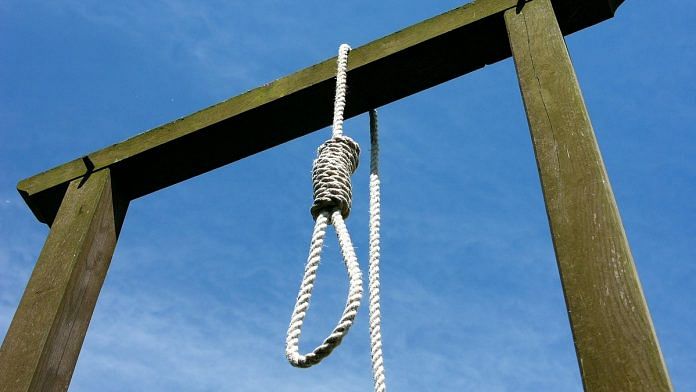New Delhi: The convicts in the 2012 December gang rape and murder case are set to be hanged at 5.30 am Friday (20 March), more than seven years after the gruesome crime.
India is one of the 55 countries where death penalty is considered a legal form of punishment and many people have been hanged since Independence. The actual figure, however, is contestable.
A 1967 law commission report had claimed that at least 1,400 prisoners were executed in just 10 years, between 1954 and 1963. After Dhananjoy Chatterjee’s death sentence was carried out in 2004, however, there were reports citing government data that he was only the 55th person to be hanged since 1947.
A 2016 study conducted by the National Law University (NLU) in Delhi put this number at 755.
The discrepancy in the figures arises mainly due to lack of official figures and the little data that is available in public domain is contradictory. There are no exact government numbers to tally the unofficial figures with.
The NLU’s Project 39A team, which conducted the study, said while they tried their best to collate data from various sources “it is an unfortunate truth that the prisons and other government departments do not have accurate records of the people they have executed”.
The four convicts in the 2012 gang rape and murder case have taken turns to exhaust all legal options available to them to avoid the death penalty. Convict Pawan Gupta’s curative petition claiming juvenility at the time of the crime was dismissed by the Supreme Court Thursday.
Three others, Akshay Singh, Pawan and Vinay Sharma, have also approached the International Court of Justice — which has the jurisdiction to arbitrate contention between two countries — to seek a stay on their death sentence.
Also read: Final wish, last meal – Why remaining hours of Dec 2012 convicts will ride an emotional wave
State-wise hangings
At 354, Uttar Pradesh has the highest number of prisoners executed since 1947, according to the NLU report. With 90, 73 and 57 hangings, respectively Haryana, Madhya Pradesh and Maharashtra compete for the second position — falling far behind Uttar Pradesh.
In Punjab, 10 people have been hanged, while Delhi has seen 24 hangings, and Gujarat eight, says the report. West Bengal saw 30 hangings, while Karnataka and Andhra Pradesh witnessed 36 and 27, respectively.
While only one death penalty has been carried out in Goa, there have been five each in Odisha and Jammu and Kashmir.
Also read: Days before hanging, 16 December rapists have ‘lost appetite, are watching Bollywood films’
Most talked about hangings in independent India
Nathuram Godse and Narayan Apte were the first convicts to be hanged in independent India, for the assassination of Mahatma Gandhi on 30 January 1948.
On 6 January 1989, Satwant and Kehar Singh were hanged for the assassination of former prime minister Indira Gandhi on 31 October 1984. The assassination, triggered by the Indira government’s Operation Bluestar to flush out armed militants holed up in the Golden Temple complex in Amritsar, was planned by Kehar and executed by Satwant and Beant Singh.
Beant was shot dead within minutes of the crime by the Indo-Tibetan Border Police.
On 9 October 1992, Harjinder Singh Jinda, who was a part of the Khalistani movement, was hanged at the Yerawada Central Jail in Pune for assassinations of Congress MP Lalit Maken, General Arun Vaidya and Congress leader Arjun Das. All his victims had some role to play in Operation Bluestar.
Gauri Shankar, better known as Auto Shankar, was a serial killer who was hanged to death in 1995 after murdering six people in Chennai’s Periyar Nagar.
Dhananjoy Chatterjee was said to be the first person to be executed in 21st century India. He had been convicted for the murder and rape of a 14-year-old girl in Kolkata.
Mohammad Afzal Guru was convicted for his role in the 2001 Parliament attack, putting India under Amnesty International’s microscope since he “did not receive legal representation of his choice or a lawyer with adequate experience at the trial stage”.
Ajmal Kasab, the lone terrorist caught alive during the 26/11 terror attacks in Mumbai in 2008, was found guilty of 80 offences including murder, waging war against India, and possessing explosives. His death sentence was upheld by the Bombay High Court and the Supreme Court, following which he was hanged at 7.30 am on 21 November 2012.
Yakub Memon was the last man to be sent to the gallows. Convicted in the 1993 Mumbai bombings, Memon was hanged on 30 July 2015.
Also read: Dread, betrayal, poverty, hope: Stories of forgotten families of 16 Dec gang rape convicts



